Organizational Behaviour: Tesco's Culture, Politics, and Motivation
VerifiedAdded on 2022/11/28
|17
|2905
|337
AI Summary
This article explores the organizational behaviour of Tesco, focusing on its culture, politics, and motivation strategies. Learn how these factors influence the workplace and employee performance.
Contribute Materials
Your contribution can guide someone’s learning journey. Share your
documents today.
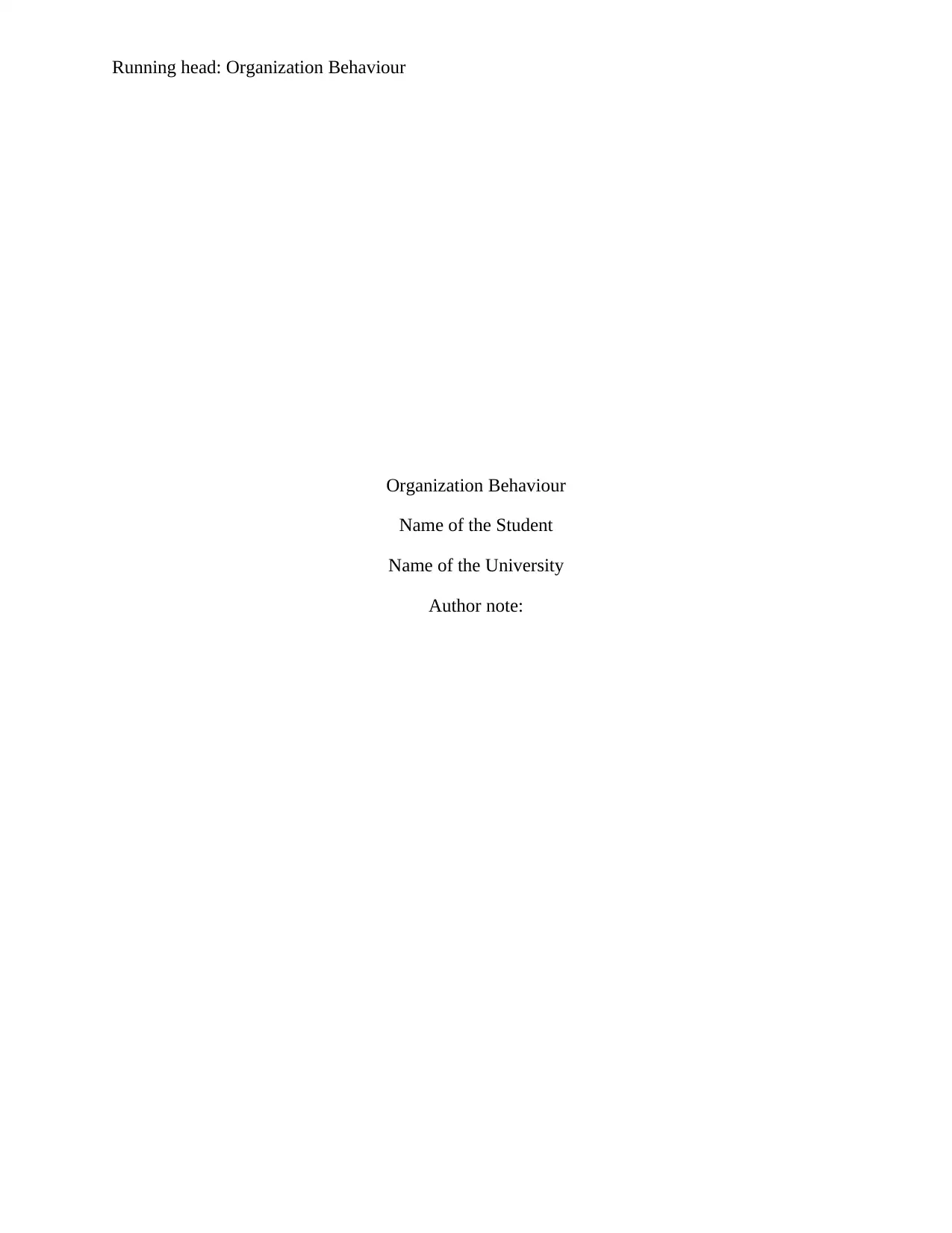
Running head: Organization Behaviour
Organization Behaviour
Name of the Student
Name of the University
Author note:
Organization Behaviour
Name of the Student
Name of the University
Author note:
Secure Best Marks with AI Grader
Need help grading? Try our AI Grader for instant feedback on your assignments.
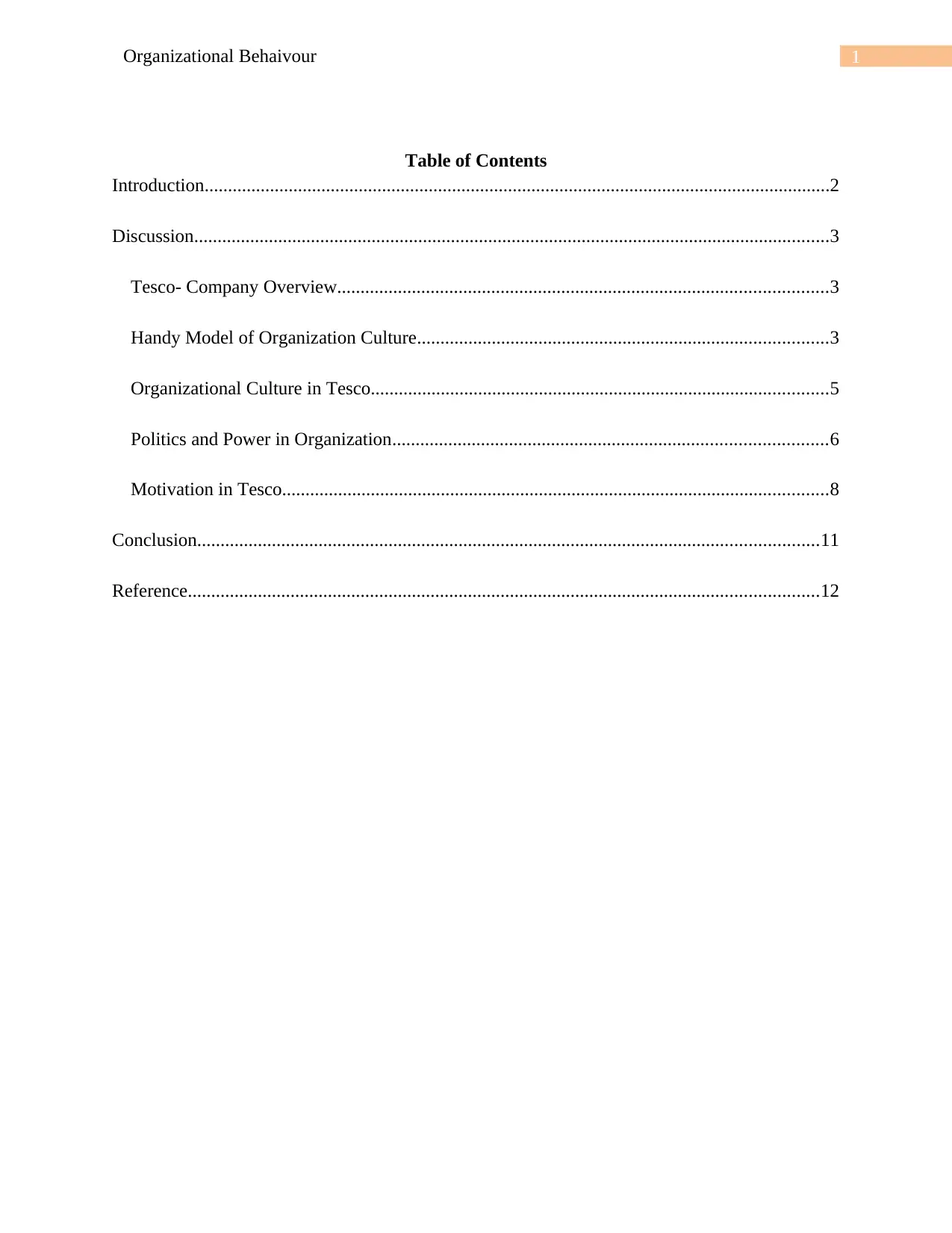
1Organizational Behaivour
Table of Contents
Introduction......................................................................................................................................2
Discussion........................................................................................................................................3
Tesco- Company Overview.........................................................................................................3
Handy Model of Organization Culture........................................................................................3
Organizational Culture in Tesco..................................................................................................5
Politics and Power in Organization.............................................................................................6
Motivation in Tesco.....................................................................................................................8
Conclusion.....................................................................................................................................11
Reference.......................................................................................................................................12
Table of Contents
Introduction......................................................................................................................................2
Discussion........................................................................................................................................3
Tesco- Company Overview.........................................................................................................3
Handy Model of Organization Culture........................................................................................3
Organizational Culture in Tesco..................................................................................................5
Politics and Power in Organization.............................................................................................6
Motivation in Tesco.....................................................................................................................8
Conclusion.....................................................................................................................................11
Reference.......................................................................................................................................12
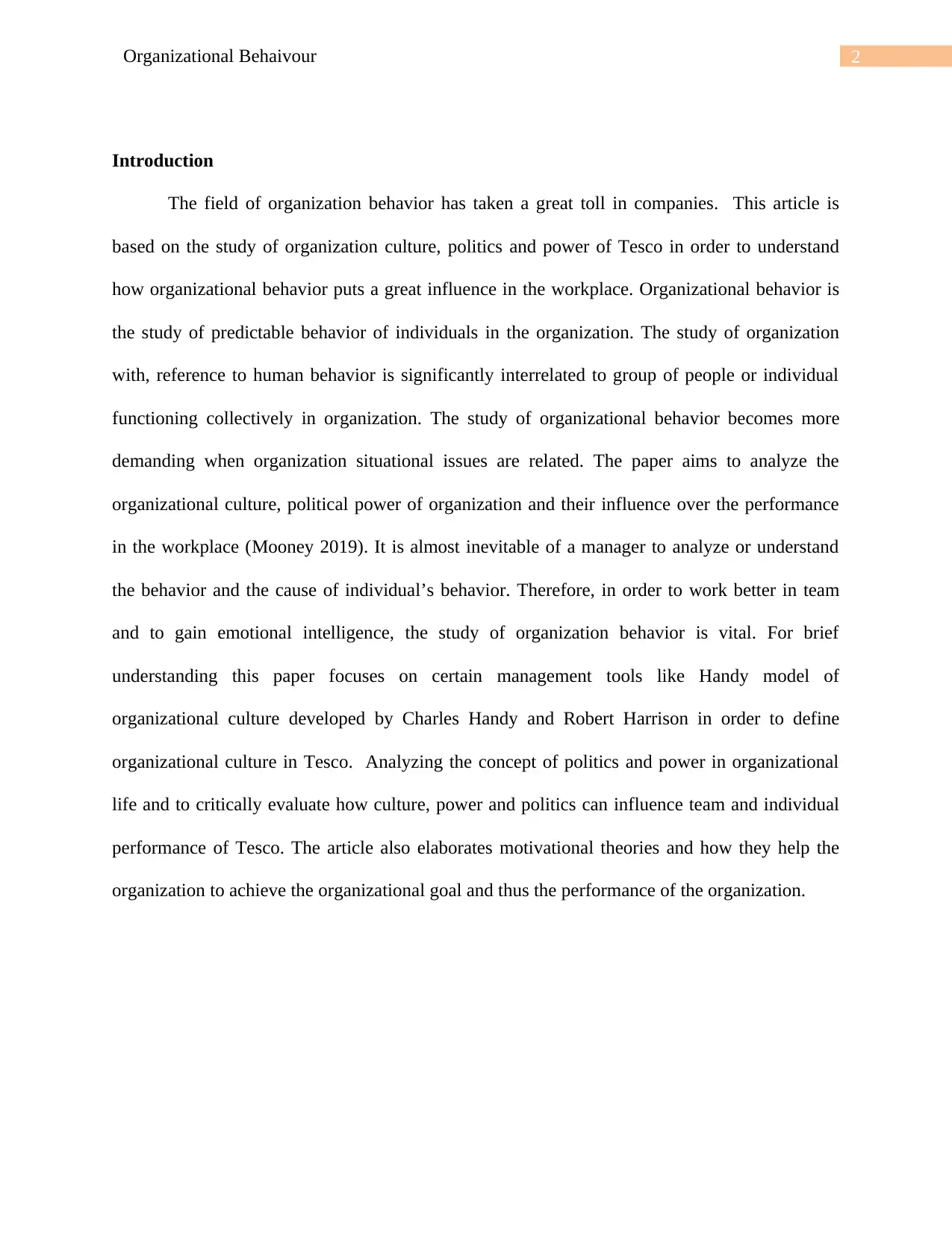
2Organizational Behaivour
Introduction
The field of organization behavior has taken a great toll in companies. This article is
based on the study of organization culture, politics and power of Tesco in order to understand
how organizational behavior puts a great influence in the workplace. Organizational behavior is
the study of predictable behavior of individuals in the organization. The study of organization
with, reference to human behavior is significantly interrelated to group of people or individual
functioning collectively in organization. The study of organizational behavior becomes more
demanding when organization situational issues are related. The paper aims to analyze the
organizational culture, political power of organization and their influence over the performance
in the workplace (Mooney 2019). It is almost inevitable of a manager to analyze or understand
the behavior and the cause of individual’s behavior. Therefore, in order to work better in team
and to gain emotional intelligence, the study of organization behavior is vital. For brief
understanding this paper focuses on certain management tools like Handy model of
organizational culture developed by Charles Handy and Robert Harrison in order to define
organizational culture in Tesco. Analyzing the concept of politics and power in organizational
life and to critically evaluate how culture, power and politics can influence team and individual
performance of Tesco. The article also elaborates motivational theories and how they help the
organization to achieve the organizational goal and thus the performance of the organization.
Introduction
The field of organization behavior has taken a great toll in companies. This article is
based on the study of organization culture, politics and power of Tesco in order to understand
how organizational behavior puts a great influence in the workplace. Organizational behavior is
the study of predictable behavior of individuals in the organization. The study of organization
with, reference to human behavior is significantly interrelated to group of people or individual
functioning collectively in organization. The study of organizational behavior becomes more
demanding when organization situational issues are related. The paper aims to analyze the
organizational culture, political power of organization and their influence over the performance
in the workplace (Mooney 2019). It is almost inevitable of a manager to analyze or understand
the behavior and the cause of individual’s behavior. Therefore, in order to work better in team
and to gain emotional intelligence, the study of organization behavior is vital. For brief
understanding this paper focuses on certain management tools like Handy model of
organizational culture developed by Charles Handy and Robert Harrison in order to define
organizational culture in Tesco. Analyzing the concept of politics and power in organizational
life and to critically evaluate how culture, power and politics can influence team and individual
performance of Tesco. The article also elaborates motivational theories and how they help the
organization to achieve the organizational goal and thus the performance of the organization.
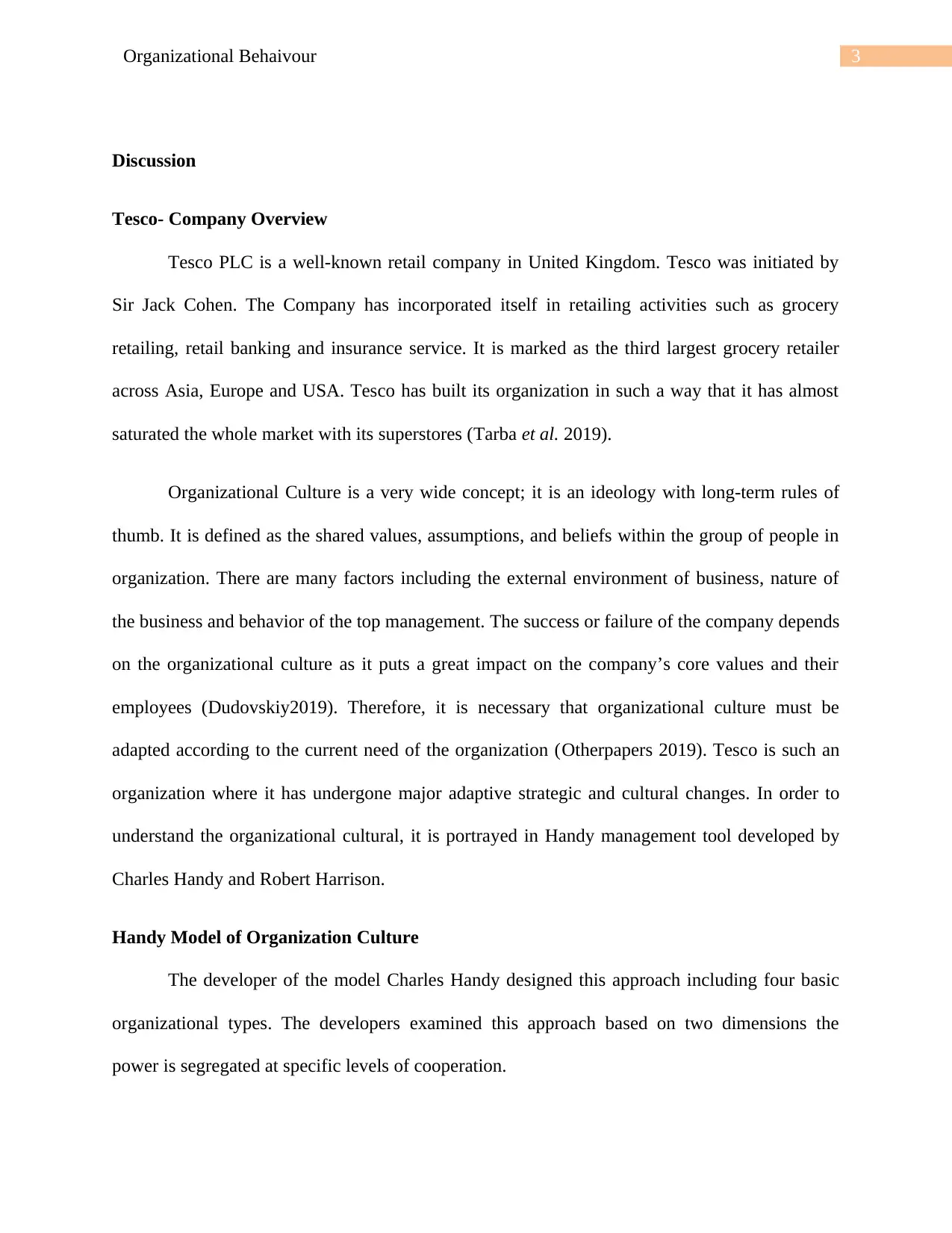
3Organizational Behaivour
Discussion
Tesco- Company Overview
Tesco PLC is a well-known retail company in United Kingdom. Tesco was initiated by
Sir Jack Cohen. The Company has incorporated itself in retailing activities such as grocery
retailing, retail banking and insurance service. It is marked as the third largest grocery retailer
across Asia, Europe and USA. Tesco has built its organization in such a way that it has almost
saturated the whole market with its superstores (Tarba et al. 2019).
Organizational Culture is a very wide concept; it is an ideology with long-term rules of
thumb. It is defined as the shared values, assumptions, and beliefs within the group of people in
organization. There are many factors including the external environment of business, nature of
the business and behavior of the top management. The success or failure of the company depends
on the organizational culture as it puts a great impact on the company’s core values and their
employees (Dudovskiy2019). Therefore, it is necessary that organizational culture must be
adapted according to the current need of the organization (Otherpapers 2019). Tesco is such an
organization where it has undergone major adaptive strategic and cultural changes. In order to
understand the organizational cultural, it is portrayed in Handy management tool developed by
Charles Handy and Robert Harrison.
Handy Model of Organization Culture
The developer of the model Charles Handy designed this approach including four basic
organizational types. The developers examined this approach based on two dimensions the
power is segregated at specific levels of cooperation.
Discussion
Tesco- Company Overview
Tesco PLC is a well-known retail company in United Kingdom. Tesco was initiated by
Sir Jack Cohen. The Company has incorporated itself in retailing activities such as grocery
retailing, retail banking and insurance service. It is marked as the third largest grocery retailer
across Asia, Europe and USA. Tesco has built its organization in such a way that it has almost
saturated the whole market with its superstores (Tarba et al. 2019).
Organizational Culture is a very wide concept; it is an ideology with long-term rules of
thumb. It is defined as the shared values, assumptions, and beliefs within the group of people in
organization. There are many factors including the external environment of business, nature of
the business and behavior of the top management. The success or failure of the company depends
on the organizational culture as it puts a great impact on the company’s core values and their
employees (Dudovskiy2019). Therefore, it is necessary that organizational culture must be
adapted according to the current need of the organization (Otherpapers 2019). Tesco is such an
organization where it has undergone major adaptive strategic and cultural changes. In order to
understand the organizational cultural, it is portrayed in Handy management tool developed by
Charles Handy and Robert Harrison.
Handy Model of Organization Culture
The developer of the model Charles Handy designed this approach including four basic
organizational types. The developers examined this approach based on two dimensions the
power is segregated at specific levels of cooperation.
Secure Best Marks with AI Grader
Need help grading? Try our AI Grader for instant feedback on your assignments.
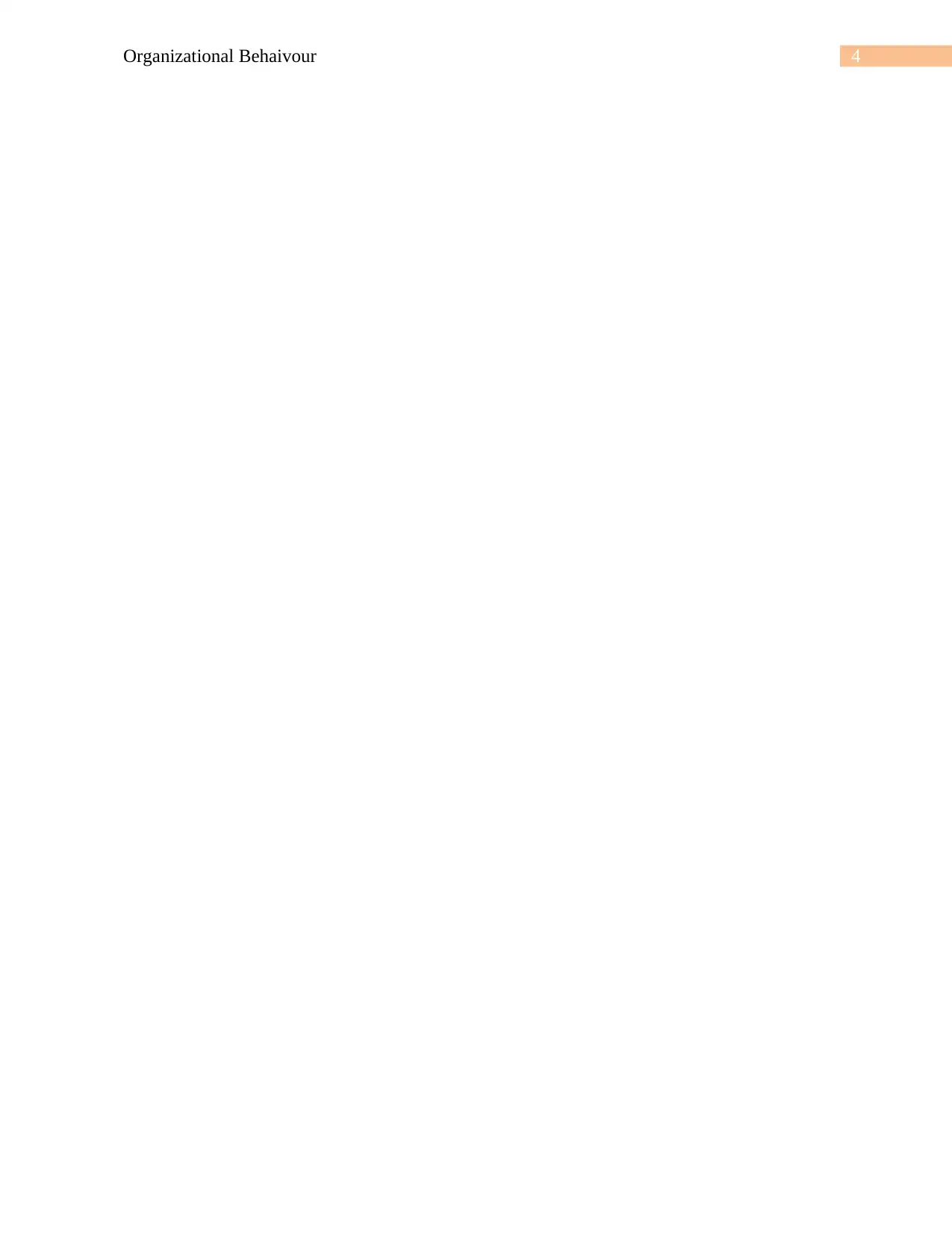
4Organizational Behaivour
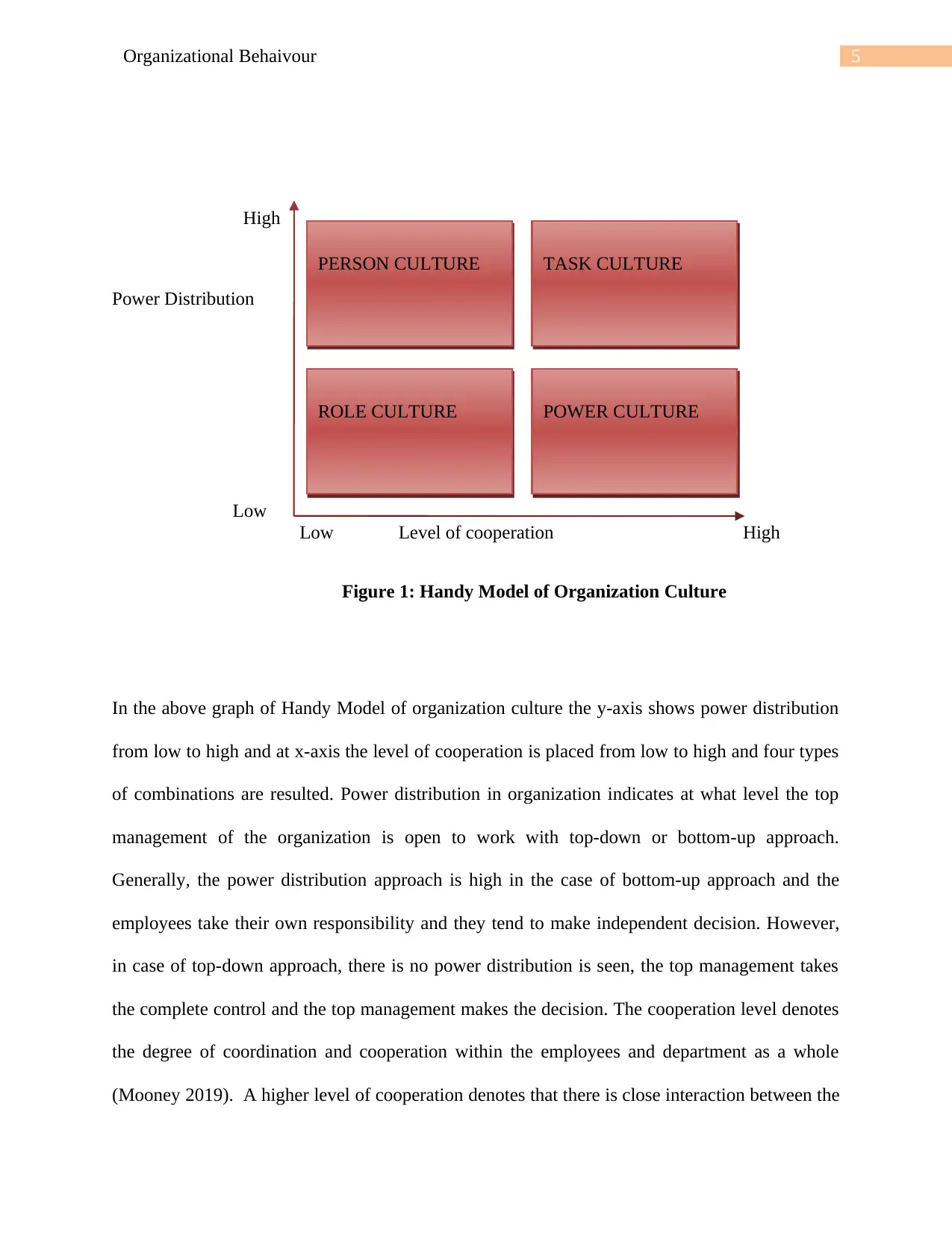
5Organizational Behaivour
Power Distribution
Level of cooperation
Figure 1: Handy Model of Organization Culture
In the above graph of Handy Model of organization culture the y-axis shows power distribution
from low to high and at x-axis the level of cooperation is placed from low to high and four types
of combinations are resulted. Power distribution in organization indicates at what level the top
management of the organization is open to work with top-down or bottom-up approach.
Generally, the power distribution approach is high in the case of bottom-up approach and the
employees take their own responsibility and they tend to make independent decision. However,
in case of top-down approach, there is no power distribution is seen, the top management takes
the complete control and the top management makes the decision. The cooperation level denotes
the degree of coordination and cooperation within the employees and department as a whole
(Mooney 2019). A higher level of cooperation denotes that there is close interaction between the
High
High
Low
Low
PERSON CULTURE
ROLE CULTURE POWER CULTURE
TASK CULTURE
Power Distribution
Level of cooperation
Figure 1: Handy Model of Organization Culture
In the above graph of Handy Model of organization culture the y-axis shows power distribution
from low to high and at x-axis the level of cooperation is placed from low to high and four types
of combinations are resulted. Power distribution in organization indicates at what level the top
management of the organization is open to work with top-down or bottom-up approach.
Generally, the power distribution approach is high in the case of bottom-up approach and the
employees take their own responsibility and they tend to make independent decision. However,
in case of top-down approach, there is no power distribution is seen, the top management takes
the complete control and the top management makes the decision. The cooperation level denotes
the degree of coordination and cooperation within the employees and department as a whole
(Mooney 2019). A higher level of cooperation denotes that there is close interaction between the
High
High
Low
Low
PERSON CULTURE
ROLE CULTURE POWER CULTURE
TASK CULTURE
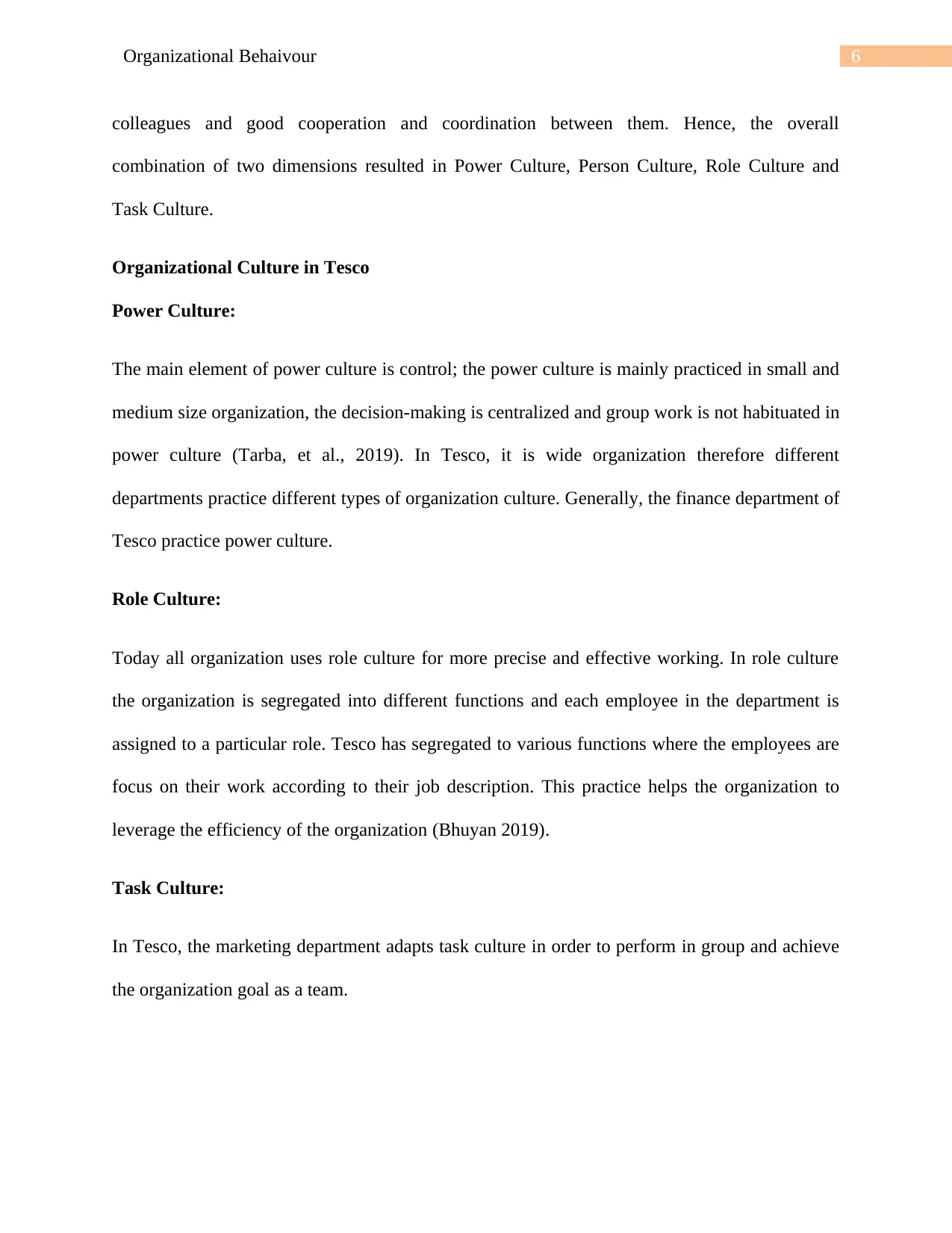
6Organizational Behaivour
colleagues and good cooperation and coordination between them. Hence, the overall
combination of two dimensions resulted in Power Culture, Person Culture, Role Culture and
Task Culture.
Organizational Culture in Tesco
Power Culture:
The main element of power culture is control; the power culture is mainly practiced in small and
medium size organization, the decision-making is centralized and group work is not habituated in
power culture (Tarba, et al., 2019). In Tesco, it is wide organization therefore different
departments practice different types of organization culture. Generally, the finance department of
Tesco practice power culture.
Role Culture:
Today all organization uses role culture for more precise and effective working. In role culture
the organization is segregated into different functions and each employee in the department is
assigned to a particular role. Tesco has segregated to various functions where the employees are
focus on their work according to their job description. This practice helps the organization to
leverage the efficiency of the organization (Bhuyan 2019).
Task Culture:
In Tesco, the marketing department adapts task culture in order to perform in group and achieve
the organization goal as a team.
colleagues and good cooperation and coordination between them. Hence, the overall
combination of two dimensions resulted in Power Culture, Person Culture, Role Culture and
Task Culture.
Organizational Culture in Tesco
Power Culture:
The main element of power culture is control; the power culture is mainly practiced in small and
medium size organization, the decision-making is centralized and group work is not habituated in
power culture (Tarba, et al., 2019). In Tesco, it is wide organization therefore different
departments practice different types of organization culture. Generally, the finance department of
Tesco practice power culture.
Role Culture:
Today all organization uses role culture for more precise and effective working. In role culture
the organization is segregated into different functions and each employee in the department is
assigned to a particular role. Tesco has segregated to various functions where the employees are
focus on their work according to their job description. This practice helps the organization to
leverage the efficiency of the organization (Bhuyan 2019).
Task Culture:
In Tesco, the marketing department adapts task culture in order to perform in group and achieve
the organization goal as a team.
Paraphrase This Document
Need a fresh take? Get an instant paraphrase of this document with our AI Paraphraser
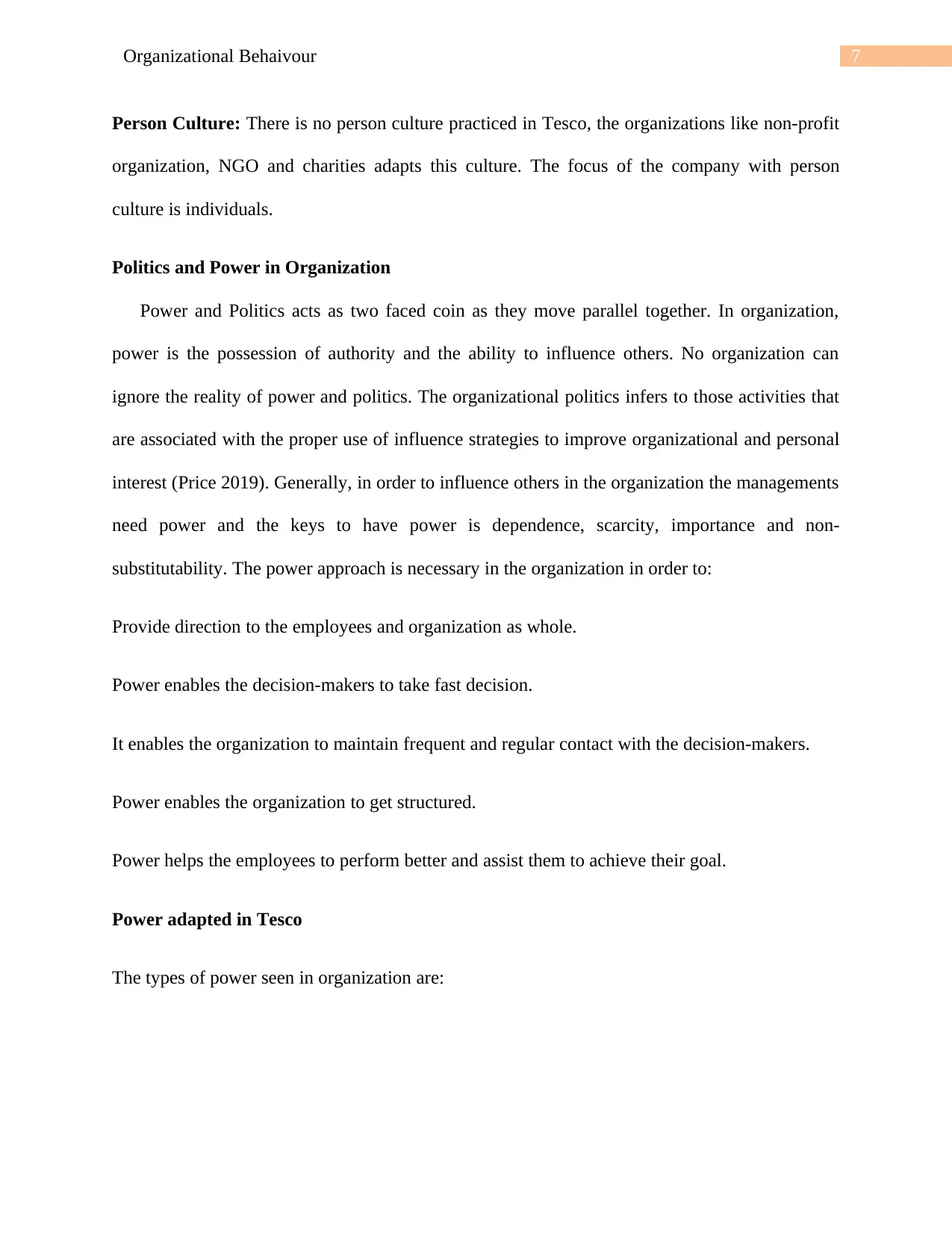
7Organizational Behaivour
Person Culture: There is no person culture practiced in Tesco, the organizations like non-profit
organization, NGO and charities adapts this culture. The focus of the company with person
culture is individuals.
Politics and Power in Organization
Power and Politics acts as two faced coin as they move parallel together. In organization,
power is the possession of authority and the ability to influence others. No organization can
ignore the reality of power and politics. The organizational politics infers to those activities that
are associated with the proper use of influence strategies to improve organizational and personal
interest (Price 2019). Generally, in order to influence others in the organization the managements
need power and the keys to have power is dependence, scarcity, importance and non-
substitutability. The power approach is necessary in the organization in order to:
Provide direction to the employees and organization as whole.
Power enables the decision-makers to take fast decision.
It enables the organization to maintain frequent and regular contact with the decision-makers.
Power enables the organization to get structured.
Power helps the employees to perform better and assist them to achieve their goal.
Power adapted in Tesco
The types of power seen in organization are:
Person Culture: There is no person culture practiced in Tesco, the organizations like non-profit
organization, NGO and charities adapts this culture. The focus of the company with person
culture is individuals.
Politics and Power in Organization
Power and Politics acts as two faced coin as they move parallel together. In organization,
power is the possession of authority and the ability to influence others. No organization can
ignore the reality of power and politics. The organizational politics infers to those activities that
are associated with the proper use of influence strategies to improve organizational and personal
interest (Price 2019). Generally, in order to influence others in the organization the managements
need power and the keys to have power is dependence, scarcity, importance and non-
substitutability. The power approach is necessary in the organization in order to:
Provide direction to the employees and organization as whole.
Power enables the decision-makers to take fast decision.
It enables the organization to maintain frequent and regular contact with the decision-makers.
Power enables the organization to get structured.
Power helps the employees to perform better and assist them to achieve their goal.
Power adapted in Tesco
The types of power seen in organization are:
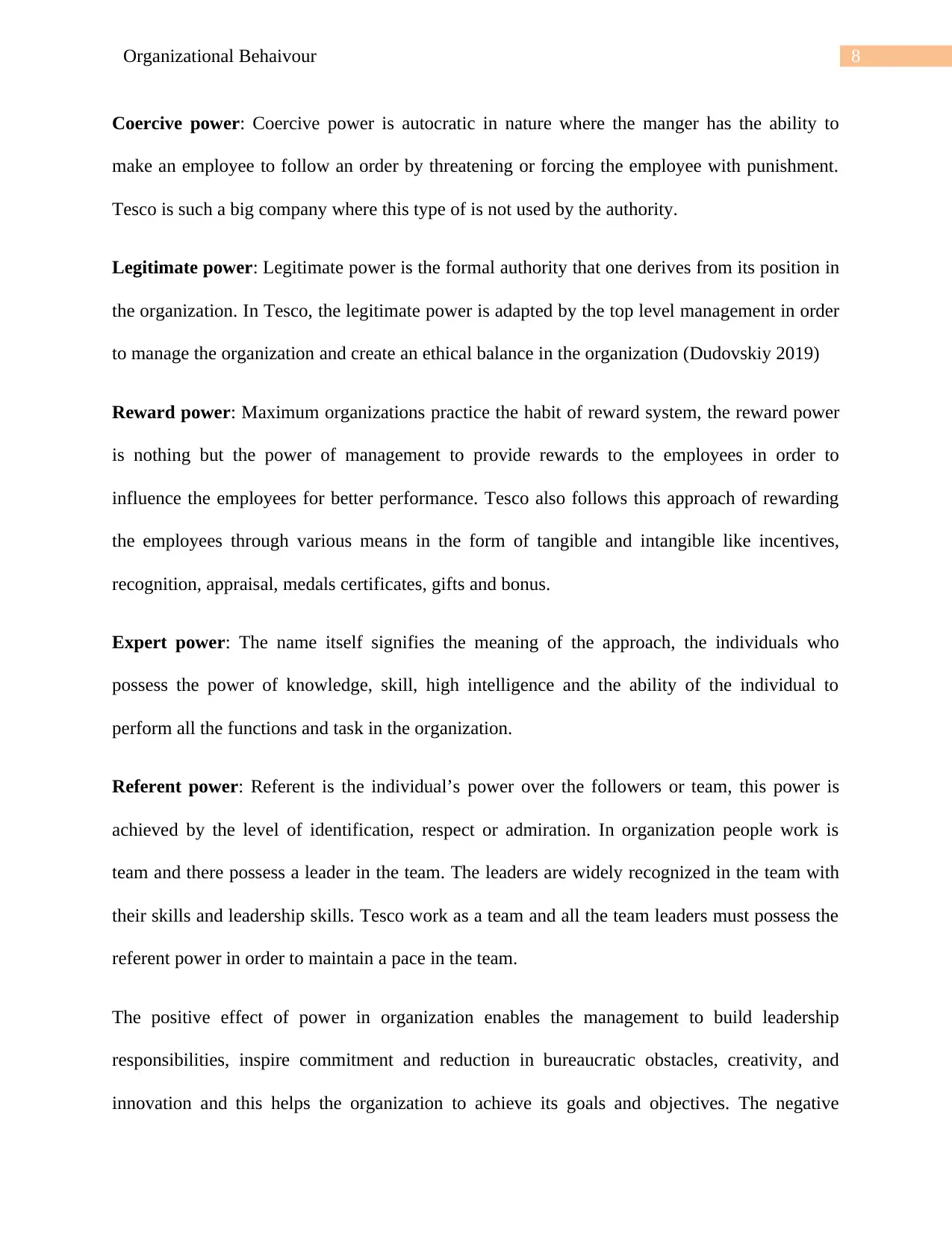
8Organizational Behaivour
Coercive power: Coercive power is autocratic in nature where the manger has the ability to
make an employee to follow an order by threatening or forcing the employee with punishment.
Tesco is such a big company where this type of is not used by the authority.
Legitimate power: Legitimate power is the formal authority that one derives from its position in
the organization. In Tesco, the legitimate power is adapted by the top level management in order
to manage the organization and create an ethical balance in the organization (Dudovskiy 2019)
Reward power: Maximum organizations practice the habit of reward system, the reward power
is nothing but the power of management to provide rewards to the employees in order to
influence the employees for better performance. Tesco also follows this approach of rewarding
the employees through various means in the form of tangible and intangible like incentives,
recognition, appraisal, medals certificates, gifts and bonus.
Expert power: The name itself signifies the meaning of the approach, the individuals who
possess the power of knowledge, skill, high intelligence and the ability of the individual to
perform all the functions and task in the organization.
Referent power: Referent is the individual’s power over the followers or team, this power is
achieved by the level of identification, respect or admiration. In organization people work is
team and there possess a leader in the team. The leaders are widely recognized in the team with
their skills and leadership skills. Tesco work as a team and all the team leaders must possess the
referent power in order to maintain a pace in the team.
The positive effect of power in organization enables the management to build leadership
responsibilities, inspire commitment and reduction in bureaucratic obstacles, creativity, and
innovation and this helps the organization to achieve its goals and objectives. The negative
Coercive power: Coercive power is autocratic in nature where the manger has the ability to
make an employee to follow an order by threatening or forcing the employee with punishment.
Tesco is such a big company where this type of is not used by the authority.
Legitimate power: Legitimate power is the formal authority that one derives from its position in
the organization. In Tesco, the legitimate power is adapted by the top level management in order
to manage the organization and create an ethical balance in the organization (Dudovskiy 2019)
Reward power: Maximum organizations practice the habit of reward system, the reward power
is nothing but the power of management to provide rewards to the employees in order to
influence the employees for better performance. Tesco also follows this approach of rewarding
the employees through various means in the form of tangible and intangible like incentives,
recognition, appraisal, medals certificates, gifts and bonus.
Expert power: The name itself signifies the meaning of the approach, the individuals who
possess the power of knowledge, skill, high intelligence and the ability of the individual to
perform all the functions and task in the organization.
Referent power: Referent is the individual’s power over the followers or team, this power is
achieved by the level of identification, respect or admiration. In organization people work is
team and there possess a leader in the team. The leaders are widely recognized in the team with
their skills and leadership skills. Tesco work as a team and all the team leaders must possess the
referent power in order to maintain a pace in the team.
The positive effect of power in organization enables the management to build leadership
responsibilities, inspire commitment and reduction in bureaucratic obstacles, creativity, and
innovation and this helps the organization to achieve its goals and objectives. The negative
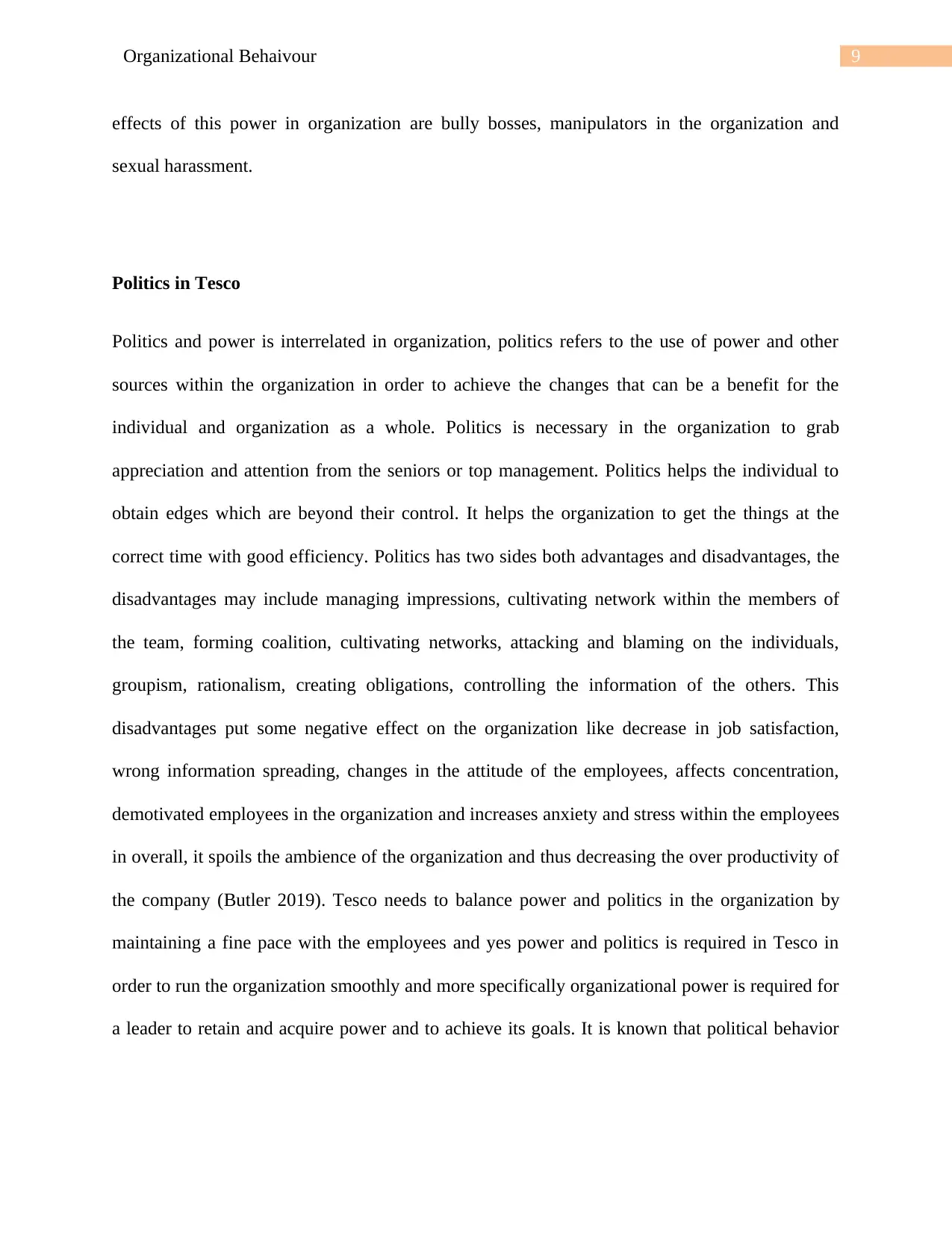
9Organizational Behaivour
effects of this power in organization are bully bosses, manipulators in the organization and
sexual harassment.
Politics in Tesco
Politics and power is interrelated in organization, politics refers to the use of power and other
sources within the organization in order to achieve the changes that can be a benefit for the
individual and organization as a whole. Politics is necessary in the organization to grab
appreciation and attention from the seniors or top management. Politics helps the individual to
obtain edges which are beyond their control. It helps the organization to get the things at the
correct time with good efficiency. Politics has two sides both advantages and disadvantages, the
disadvantages may include managing impressions, cultivating network within the members of
the team, forming coalition, cultivating networks, attacking and blaming on the individuals,
groupism, rationalism, creating obligations, controlling the information of the others. This
disadvantages put some negative effect on the organization like decrease in job satisfaction,
wrong information spreading, changes in the attitude of the employees, affects concentration,
demotivated employees in the organization and increases anxiety and stress within the employees
in overall, it spoils the ambience of the organization and thus decreasing the over productivity of
the company (Butler 2019). Tesco needs to balance power and politics in the organization by
maintaining a fine pace with the employees and yes power and politics is required in Tesco in
order to run the organization smoothly and more specifically organizational power is required for
a leader to retain and acquire power and to achieve its goals. It is known that political behavior
effects of this power in organization are bully bosses, manipulators in the organization and
sexual harassment.
Politics in Tesco
Politics and power is interrelated in organization, politics refers to the use of power and other
sources within the organization in order to achieve the changes that can be a benefit for the
individual and organization as a whole. Politics is necessary in the organization to grab
appreciation and attention from the seniors or top management. Politics helps the individual to
obtain edges which are beyond their control. It helps the organization to get the things at the
correct time with good efficiency. Politics has two sides both advantages and disadvantages, the
disadvantages may include managing impressions, cultivating network within the members of
the team, forming coalition, cultivating networks, attacking and blaming on the individuals,
groupism, rationalism, creating obligations, controlling the information of the others. This
disadvantages put some negative effect on the organization like decrease in job satisfaction,
wrong information spreading, changes in the attitude of the employees, affects concentration,
demotivated employees in the organization and increases anxiety and stress within the employees
in overall, it spoils the ambience of the organization and thus decreasing the over productivity of
the company (Butler 2019). Tesco needs to balance power and politics in the organization by
maintaining a fine pace with the employees and yes power and politics is required in Tesco in
order to run the organization smoothly and more specifically organizational power is required for
a leader to retain and acquire power and to achieve its goals. It is known that political behavior
Secure Best Marks with AI Grader
Need help grading? Try our AI Grader for instant feedback on your assignments.
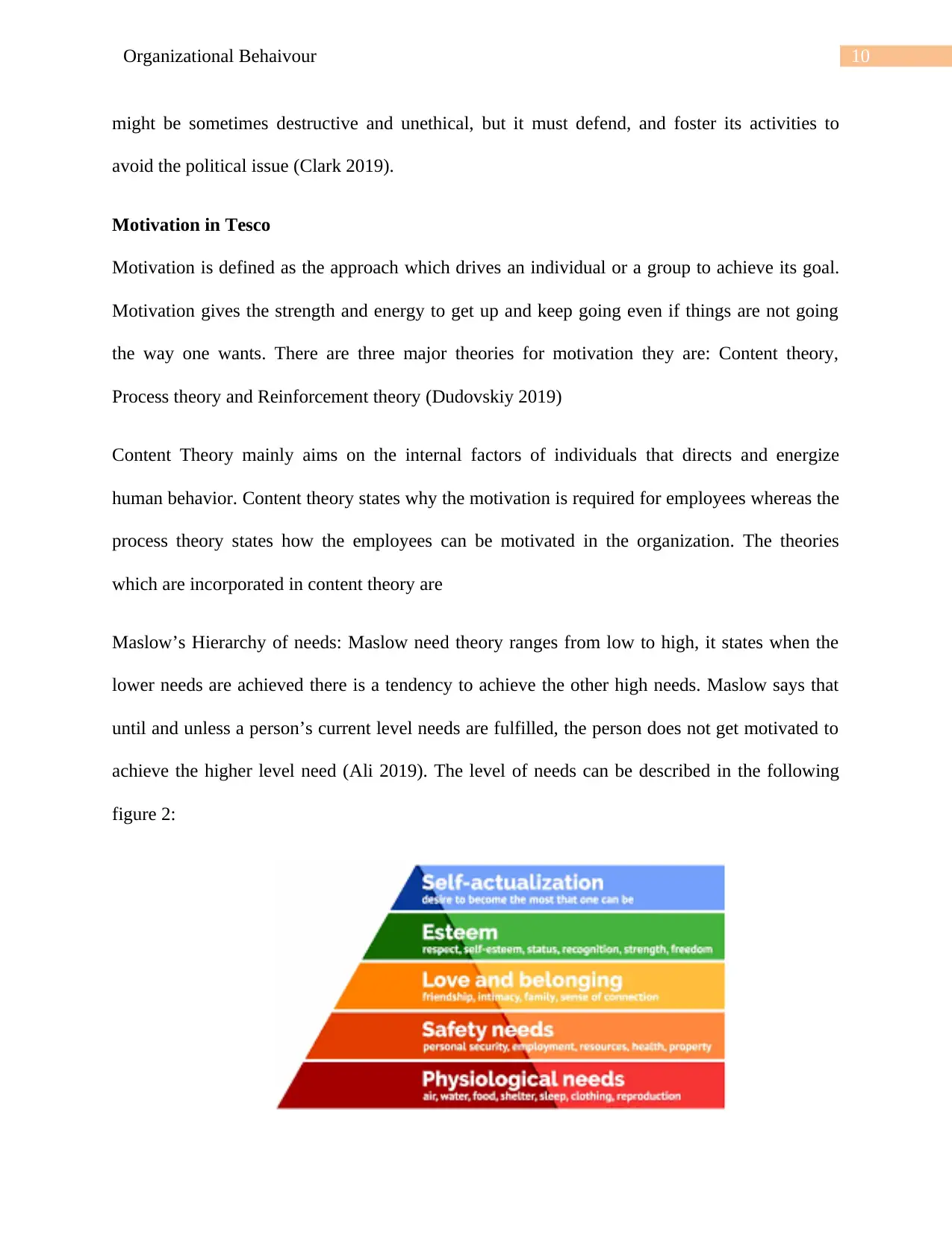
10Organizational Behaivour
might be sometimes destructive and unethical, but it must defend, and foster its activities to
avoid the political issue (Clark 2019).
Motivation in Tesco
Motivation is defined as the approach which drives an individual or a group to achieve its goal.
Motivation gives the strength and energy to get up and keep going even if things are not going
the way one wants. There are three major theories for motivation they are: Content theory,
Process theory and Reinforcement theory (Dudovskiy 2019)
Content Theory mainly aims on the internal factors of individuals that directs and energize
human behavior. Content theory states why the motivation is required for employees whereas the
process theory states how the employees can be motivated in the organization. The theories
which are incorporated in content theory are
Maslow’s Hierarchy of needs: Maslow need theory ranges from low to high, it states when the
lower needs are achieved there is a tendency to achieve the other high needs. Maslow says that
until and unless a person’s current level needs are fulfilled, the person does not get motivated to
achieve the higher level need (Ali 2019). The level of needs can be described in the following
figure 2:
might be sometimes destructive and unethical, but it must defend, and foster its activities to
avoid the political issue (Clark 2019).
Motivation in Tesco
Motivation is defined as the approach which drives an individual or a group to achieve its goal.
Motivation gives the strength and energy to get up and keep going even if things are not going
the way one wants. There are three major theories for motivation they are: Content theory,
Process theory and Reinforcement theory (Dudovskiy 2019)
Content Theory mainly aims on the internal factors of individuals that directs and energize
human behavior. Content theory states why the motivation is required for employees whereas the
process theory states how the employees can be motivated in the organization. The theories
which are incorporated in content theory are
Maslow’s Hierarchy of needs: Maslow need theory ranges from low to high, it states when the
lower needs are achieved there is a tendency to achieve the other high needs. Maslow says that
until and unless a person’s current level needs are fulfilled, the person does not get motivated to
achieve the higher level need (Ali 2019). The level of needs can be described in the following
figure 2:
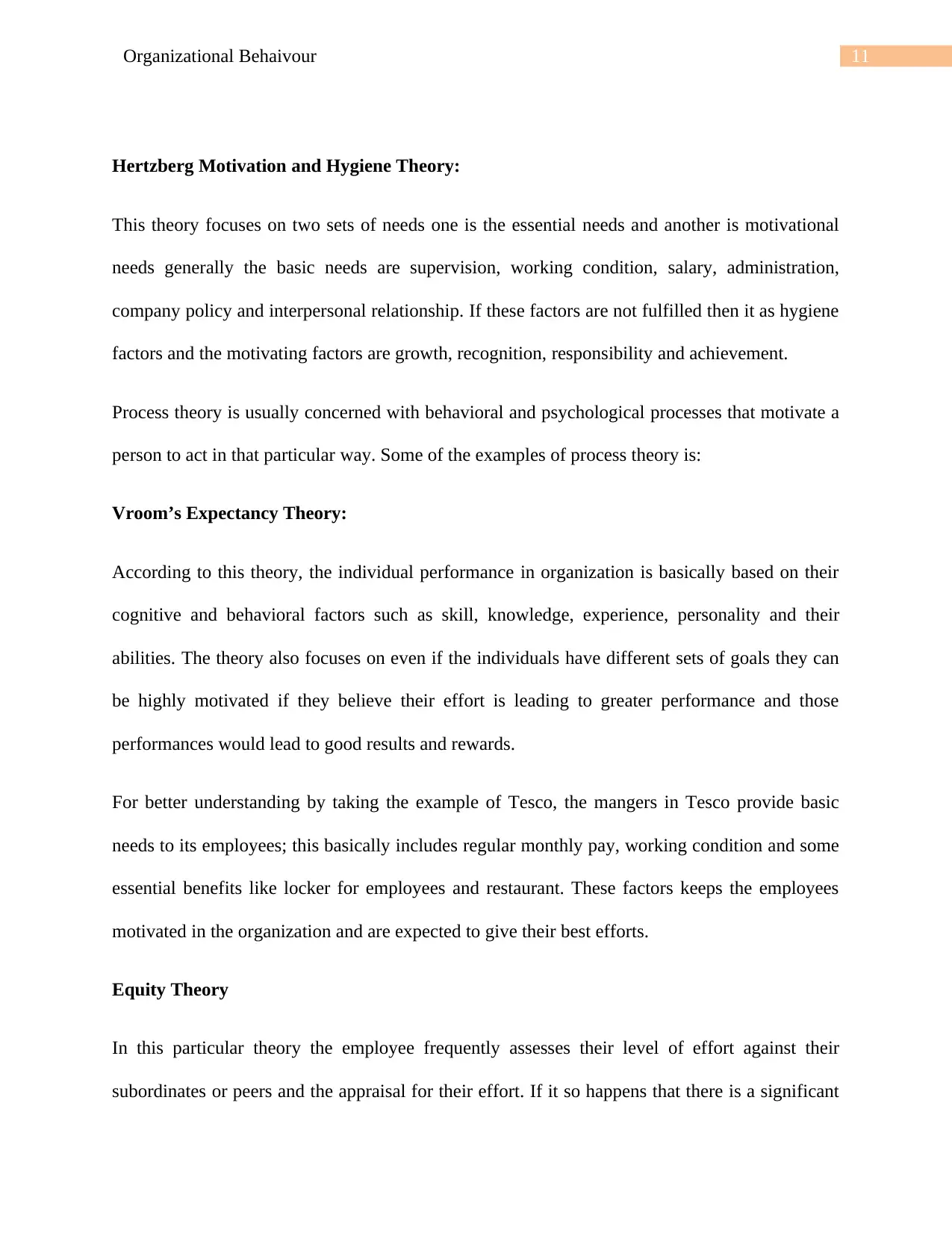
11Organizational Behaivour
Hertzberg Motivation and Hygiene Theory:
This theory focuses on two sets of needs one is the essential needs and another is motivational
needs generally the basic needs are supervision, working condition, salary, administration,
company policy and interpersonal relationship. If these factors are not fulfilled then it as hygiene
factors and the motivating factors are growth, recognition, responsibility and achievement.
Process theory is usually concerned with behavioral and psychological processes that motivate a
person to act in that particular way. Some of the examples of process theory is:
Vroom’s Expectancy Theory:
According to this theory, the individual performance in organization is basically based on their
cognitive and behavioral factors such as skill, knowledge, experience, personality and their
abilities. The theory also focuses on even if the individuals have different sets of goals they can
be highly motivated if they believe their effort is leading to greater performance and those
performances would lead to good results and rewards.
For better understanding by taking the example of Tesco, the mangers in Tesco provide basic
needs to its employees; this basically includes regular monthly pay, working condition and some
essential benefits like locker for employees and restaurant. These factors keeps the employees
motivated in the organization and are expected to give their best efforts.
Equity Theory
In this particular theory the employee frequently assesses their level of effort against their
subordinates or peers and the appraisal for their effort. If it so happens that there is a significant
Hertzberg Motivation and Hygiene Theory:
This theory focuses on two sets of needs one is the essential needs and another is motivational
needs generally the basic needs are supervision, working condition, salary, administration,
company policy and interpersonal relationship. If these factors are not fulfilled then it as hygiene
factors and the motivating factors are growth, recognition, responsibility and achievement.
Process theory is usually concerned with behavioral and psychological processes that motivate a
person to act in that particular way. Some of the examples of process theory is:
Vroom’s Expectancy Theory:
According to this theory, the individual performance in organization is basically based on their
cognitive and behavioral factors such as skill, knowledge, experience, personality and their
abilities. The theory also focuses on even if the individuals have different sets of goals they can
be highly motivated if they believe their effort is leading to greater performance and those
performances would lead to good results and rewards.
For better understanding by taking the example of Tesco, the mangers in Tesco provide basic
needs to its employees; this basically includes regular monthly pay, working condition and some
essential benefits like locker for employees and restaurant. These factors keeps the employees
motivated in the organization and are expected to give their best efforts.
Equity Theory
In this particular theory the employee frequently assesses their level of effort against their
subordinates or peers and the appraisal for their effort. If it so happens that there is a significant
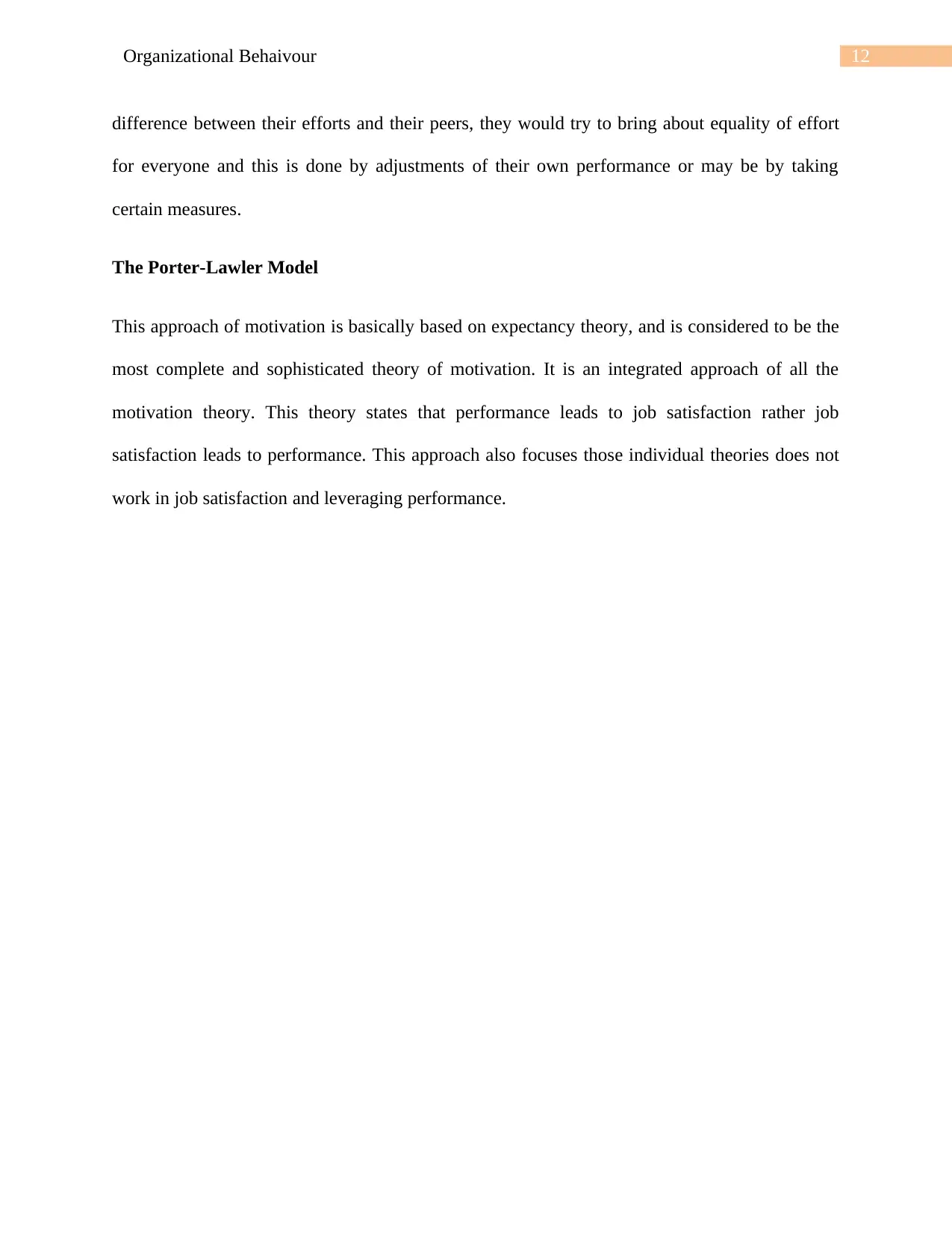
12Organizational Behaivour
difference between their efforts and their peers, they would try to bring about equality of effort
for everyone and this is done by adjustments of their own performance or may be by taking
certain measures.
The Porter-Lawler Model
This approach of motivation is basically based on expectancy theory, and is considered to be the
most complete and sophisticated theory of motivation. It is an integrated approach of all the
motivation theory. This theory states that performance leads to job satisfaction rather job
satisfaction leads to performance. This approach also focuses those individual theories does not
work in job satisfaction and leveraging performance.
difference between their efforts and their peers, they would try to bring about equality of effort
for everyone and this is done by adjustments of their own performance or may be by taking
certain measures.
The Porter-Lawler Model
This approach of motivation is basically based on expectancy theory, and is considered to be the
most complete and sophisticated theory of motivation. It is an integrated approach of all the
motivation theory. This theory states that performance leads to job satisfaction rather job
satisfaction leads to performance. This approach also focuses those individual theories does not
work in job satisfaction and leveraging performance.
Paraphrase This Document
Need a fresh take? Get an instant paraphrase of this document with our AI Paraphraser
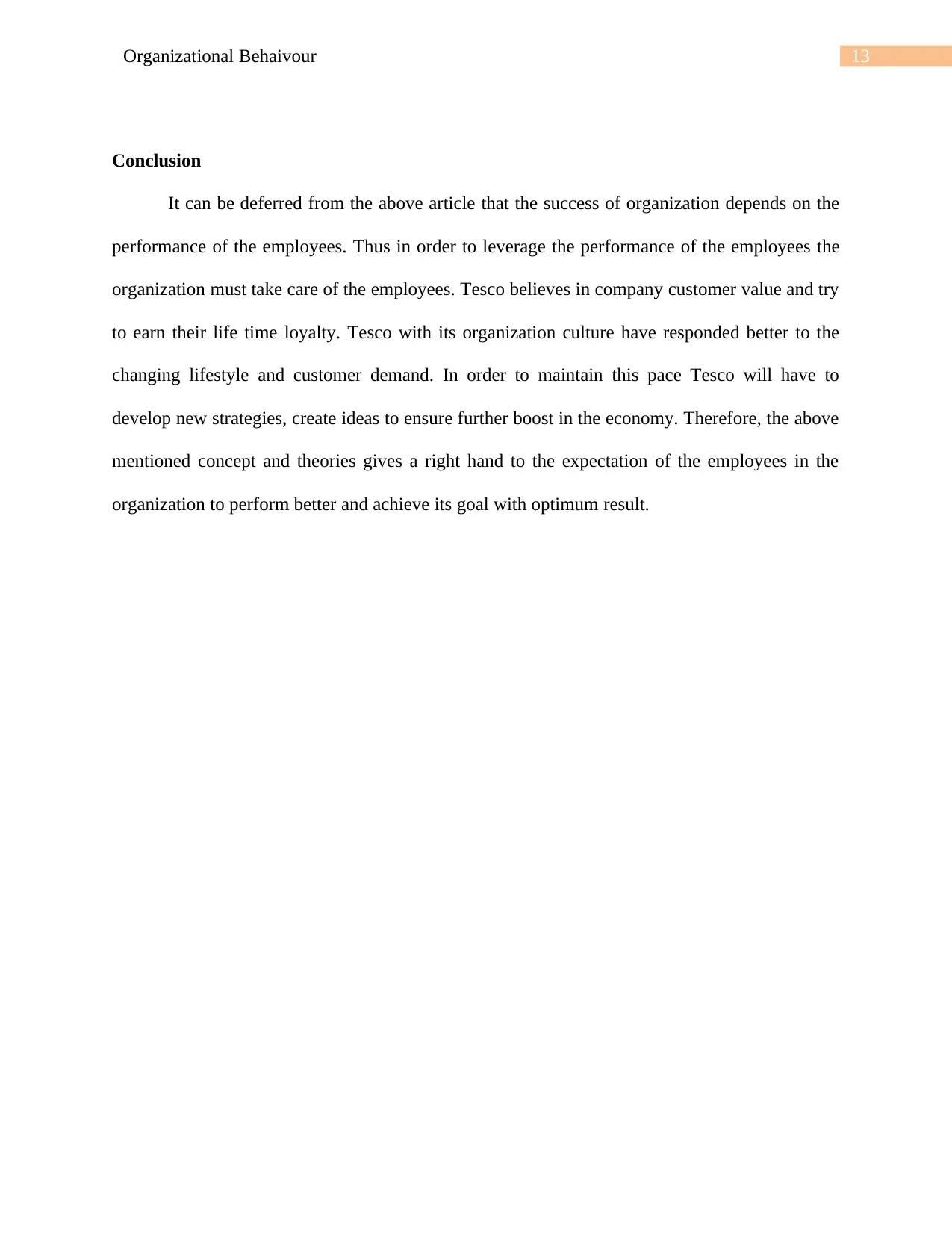
13Organizational Behaivour
Conclusion
It can be deferred from the above article that the success of organization depends on the
performance of the employees. Thus in order to leverage the performance of the employees the
organization must take care of the employees. Tesco believes in company customer value and try
to earn their life time loyalty. Tesco with its organization culture have responded better to the
changing lifestyle and customer demand. In order to maintain this pace Tesco will have to
develop new strategies, create ideas to ensure further boost in the economy. Therefore, the above
mentioned concept and theories gives a right hand to the expectation of the employees in the
organization to perform better and achieve its goal with optimum result.
Conclusion
It can be deferred from the above article that the success of organization depends on the
performance of the employees. Thus in order to leverage the performance of the employees the
organization must take care of the employees. Tesco believes in company customer value and try
to earn their life time loyalty. Tesco with its organization culture have responded better to the
changing lifestyle and customer demand. In order to maintain this pace Tesco will have to
develop new strategies, create ideas to ensure further boost in the economy. Therefore, the above
mentioned concept and theories gives a right hand to the expectation of the employees in the
organization to perform better and achieve its goal with optimum result.
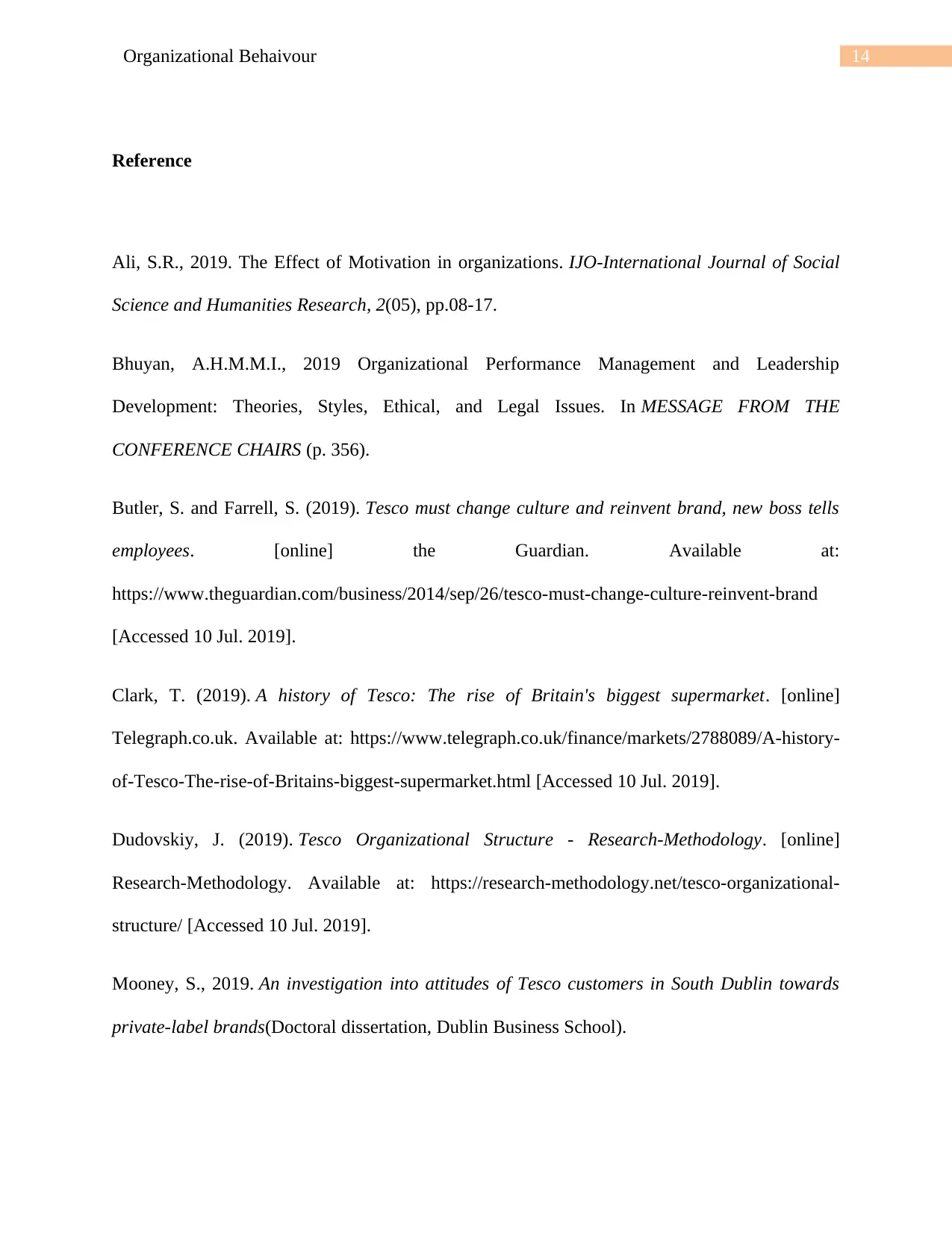
14Organizational Behaivour
Reference
Ali, S.R., 2019. The Effect of Motivation in organizations. IJO-International Journal of Social
Science and Humanities Research, 2(05), pp.08-17.
Bhuyan, A.H.M.M.I., 2019 Organizational Performance Management and Leadership
Development: Theories, Styles, Ethical, and Legal Issues. In MESSAGE FROM THE
CONFERENCE CHAIRS (p. 356).
Butler, S. and Farrell, S. (2019). Tesco must change culture and reinvent brand, new boss tells
employees. [online] the Guardian. Available at:
https://www.theguardian.com/business/2014/sep/26/tesco-must-change-culture-reinvent-brand
[Accessed 10 Jul. 2019].
Clark, T. (2019). A history of Tesco: The rise of Britain's biggest supermarket. [online]
Telegraph.co.uk. Available at: https://www.telegraph.co.uk/finance/markets/2788089/A-history-
of-Tesco-The-rise-of-Britains-biggest-supermarket.html [Accessed 10 Jul. 2019].
Dudovskiy, J. (2019). Tesco Organizational Structure - Research-Methodology. [online]
Research-Methodology. Available at: https://research-methodology.net/tesco-organizational-
structure/ [Accessed 10 Jul. 2019].
Mooney, S., 2019. An investigation into attitudes of Tesco customers in South Dublin towards
private-label brands(Doctoral dissertation, Dublin Business School).
Reference
Ali, S.R., 2019. The Effect of Motivation in organizations. IJO-International Journal of Social
Science and Humanities Research, 2(05), pp.08-17.
Bhuyan, A.H.M.M.I., 2019 Organizational Performance Management and Leadership
Development: Theories, Styles, Ethical, and Legal Issues. In MESSAGE FROM THE
CONFERENCE CHAIRS (p. 356).
Butler, S. and Farrell, S. (2019). Tesco must change culture and reinvent brand, new boss tells
employees. [online] the Guardian. Available at:
https://www.theguardian.com/business/2014/sep/26/tesco-must-change-culture-reinvent-brand
[Accessed 10 Jul. 2019].
Clark, T. (2019). A history of Tesco: The rise of Britain's biggest supermarket. [online]
Telegraph.co.uk. Available at: https://www.telegraph.co.uk/finance/markets/2788089/A-history-
of-Tesco-The-rise-of-Britains-biggest-supermarket.html [Accessed 10 Jul. 2019].
Dudovskiy, J. (2019). Tesco Organizational Structure - Research-Methodology. [online]
Research-Methodology. Available at: https://research-methodology.net/tesco-organizational-
structure/ [Accessed 10 Jul. 2019].
Mooney, S., 2019. An investigation into attitudes of Tesco customers in South Dublin towards
private-label brands(Doctoral dissertation, Dublin Business School).
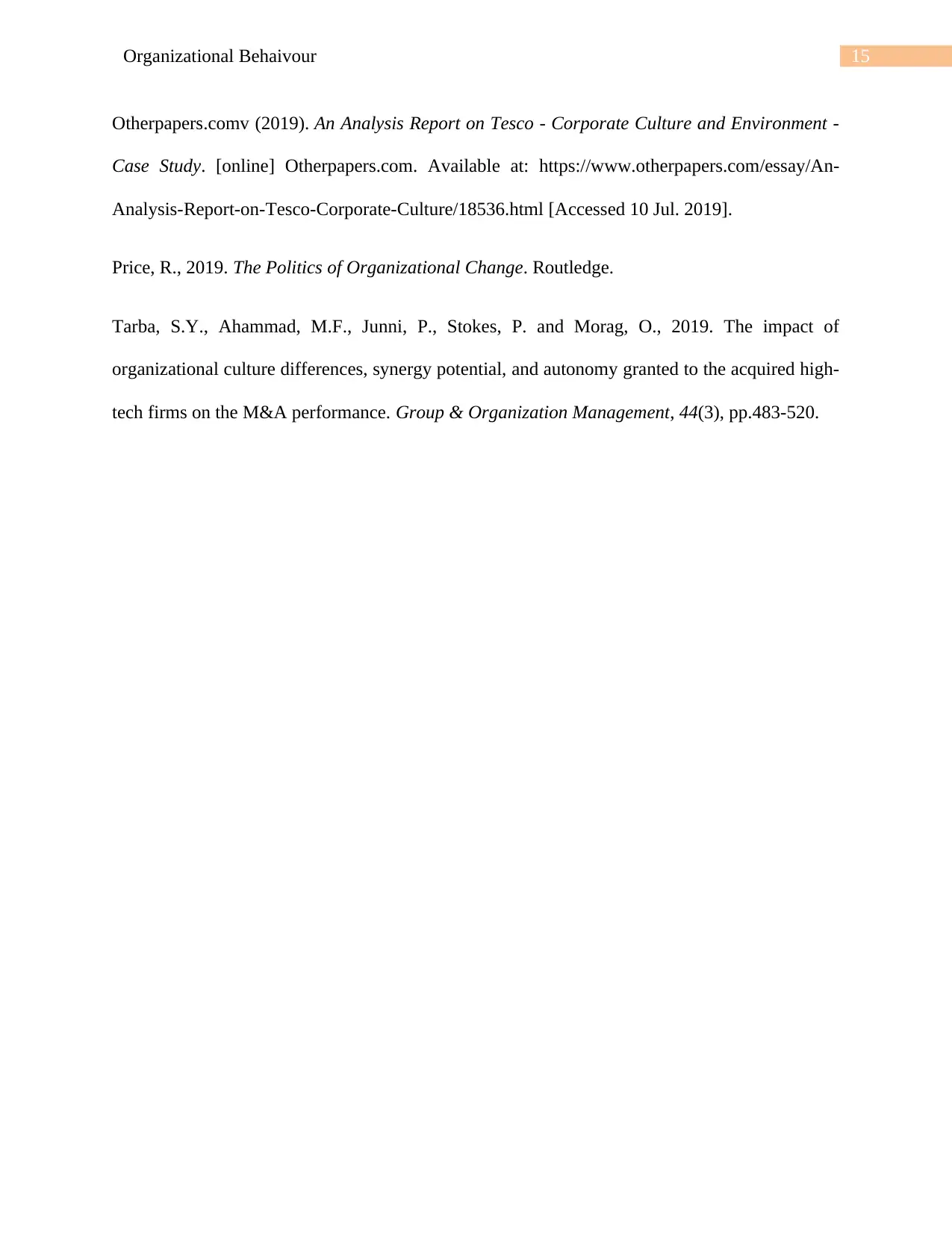
15Organizational Behaivour
Otherpapers.comv (2019). An Analysis Report on Tesco - Corporate Culture and Environment -
Case Study. [online] Otherpapers.com. Available at: https://www.otherpapers.com/essay/An-
Analysis-Report-on-Tesco-Corporate-Culture/18536.html [Accessed 10 Jul. 2019].
Price, R., 2019. The Politics of Organizational Change. Routledge.
Tarba, S.Y., Ahammad, M.F., Junni, P., Stokes, P. and Morag, O., 2019. The impact of
organizational culture differences, synergy potential, and autonomy granted to the acquired high-
tech firms on the M&A performance. Group & Organization Management, 44(3), pp.483-520.
Otherpapers.comv (2019). An Analysis Report on Tesco - Corporate Culture and Environment -
Case Study. [online] Otherpapers.com. Available at: https://www.otherpapers.com/essay/An-
Analysis-Report-on-Tesco-Corporate-Culture/18536.html [Accessed 10 Jul. 2019].
Price, R., 2019. The Politics of Organizational Change. Routledge.
Tarba, S.Y., Ahammad, M.F., Junni, P., Stokes, P. and Morag, O., 2019. The impact of
organizational culture differences, synergy potential, and autonomy granted to the acquired high-
tech firms on the M&A performance. Group & Organization Management, 44(3), pp.483-520.
Secure Best Marks with AI Grader
Need help grading? Try our AI Grader for instant feedback on your assignments.
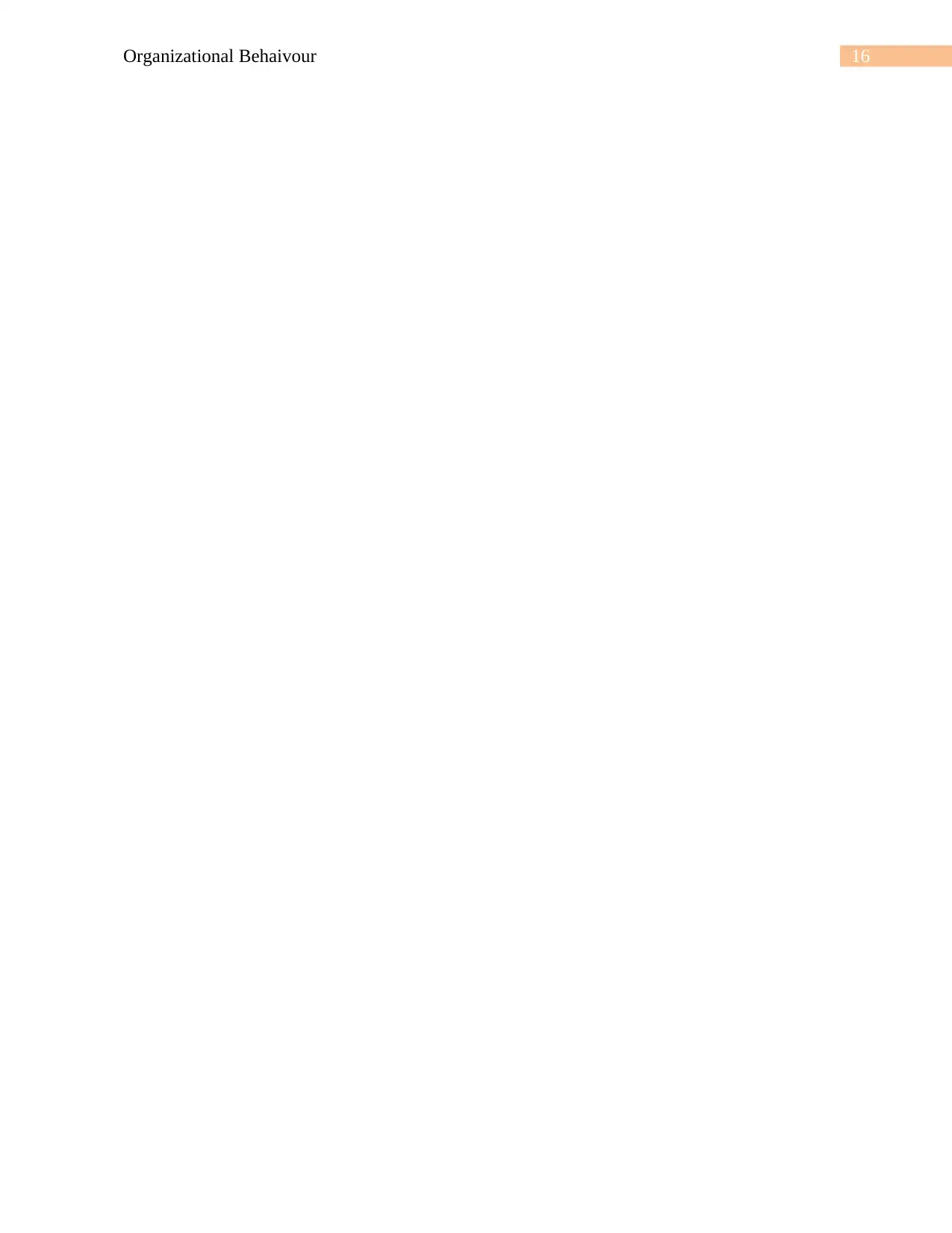
16Organizational Behaivour
1 out of 17
Related Documents
Your All-in-One AI-Powered Toolkit for Academic Success.
+13062052269
info@desklib.com
Available 24*7 on WhatsApp / Email
![[object Object]](/_next/static/media/star-bottom.7253800d.svg)
Unlock your academic potential
© 2024 | Zucol Services PVT LTD | All rights reserved.





